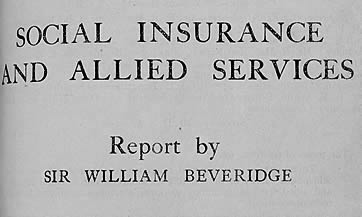‘Cradle to Grave’ for new times
A few days ago I heard a homeless woman say she’d ‘worked all her life’ but ended up on the streets. Perhaps she’s the tip of the iceberg. A growing number of working people are relying on food banks, working...
A few days ago I heard a homeless woman say she’d ‘worked all her life’ but ended up on the streets. Perhaps she’s the tip of the iceberg. A growing number of working people are relying on food banks, working too few hours or for too little money to buy enough food for the week. Parents go without, to feed their kids and rely on school dinners to be the hot meal for the day. Two of William Beveridge’s five giants were ‘want’ and ‘idleness’: when working people cannot earn enough to make ends meet, even when they’re desperately trying, we are far from slaying his giants.
Under this government things are going backwards. The Coalition will have undone all Labour’s gains on child poverty by 2020. In old age, services are being stripped bare leaving older people without basic care. We are returning to Victorian levels of inequality with the ‘have nots’ facing lousy, insecure jobs, unable to make work pay; while many well-paid ‘haves’ are time-poor and unable to enjoy life or give to others.
The Fabians were founded in 1884 when reformers were obsessed with spreading education to all, in order to open up opportunities and even-out inequalities but also to extend personal fulfillment. In our own era of squeezed public spending, Ed Miliband also emphasises personal fulfillment alongside prosperity, recognising that once you reach certain levels of material comfort, happiness is only loosely linked to income.
When Labour returns to office, it will inherit a daunting landscape, with people feeling adrift and insecure as the world changes around them; but it will also face fresh challenges the coalition has not started to embrace. Chief among them is how to adapt the welfare state so that when we say ‘cradle to grave’ we still mean it, in our centenarian society.
With one in four toddlers now expected to live to 100, now is the time to look across our lives and invent a fresh Labour vision of opportunity and security from ‘cradle to grave’. We need to rebuild a society where everyone has a chance to be a child; has time for study, for paid work, to volunteer, to enjoy sport and culture; to care for others young and old; to live a fulfilling life that also sustains our planet for the next generation.
First, this new settlement should provide minimum entitlements: tackling poverty pay by pushing for the living wage; giving private renters long-term tenancies so they can put down roots; introducing a job or apprenticeship guarantee for every young person; and enabling families with caring responsibilities to work whilst they support older or disabled relatives.
Second, we need an emphasis on prevention not just cure, across our lives. With Sure Start, Labour invested early and this principle should be applied to every area of public life, to keep people out of the jobcentre, hospital and prison. When agencies collaborate with families they can help prevent children from being excluded from school and grandparents from ending up in care homes: joined-up working between agencies, with the family at the centre, should be what we all come to expect.
Third, Labour’s policies should recognise that aspiration lasts our whole life. No matter how long we live, we should be treated as fully-fledged citizens with the capability to do new and exciting things. Andy Burnham’s proposals for pooling health and social care for older people can bring this to life, if they are founded on principles of empowerment, dignity and support.
Fourth, a renewed philosophy of ‘cradle to grave’ means giving people second and third chances so that if school doesn’t work out, students still get a shot at employment or study and those affected by disability or illness are supported to be contributing citizens. The Conservatives’ state-shrinking zeal tells citizens to sink or swim. Labour’s response should be an enabling state that extends a hand to help people respond and build resilience when they’re faced with the inevitable ‘snakes and ladders’ that will be thrown up during our long, long lives.
A fresh ‘cradle to grave’ settlement is about a strong state that provides the secure guarantees and empowering opportunities. But it must also be a vision of what we can do for each other, restating Beveridge’s original idea of a partnership between the State and the individual. We need to design homes and neighbourhoods so that people of all ages live side-by-side and take responsibility for each other. And we need new partnerships that build future prospects, for example between local companies, universities, councils and new regional banks, to create the next entrepreneurial graduates whose start-up businesses will create the skills and jobs of the future.
Over their long lives children born today will see the rise of major new economies and buy technologies we can hardly dream of. They will face many personal changes too. So Labour’s new vision of ‘cradle to grave’ should match a safety net of minimum entitlements with continuing, lifelong support that equips us all to be resilient and adaptable: to do work differently, to learn a new trade, or to make the most of life with the onset of disease. The litmus test is this: in our children’s 100 year lives, they should never need to rely on food parcels.
This article is based on a speech given to Brighton and Hove Fabian Society in May.
